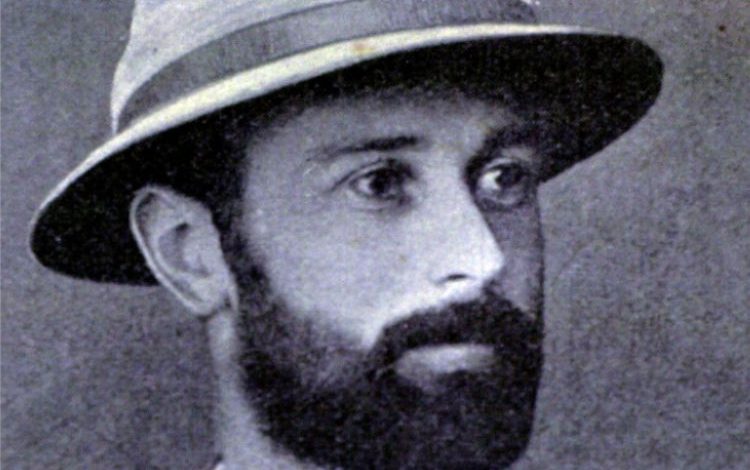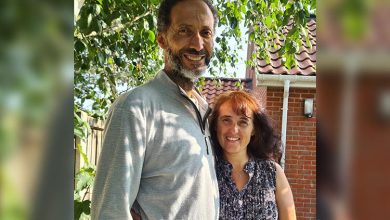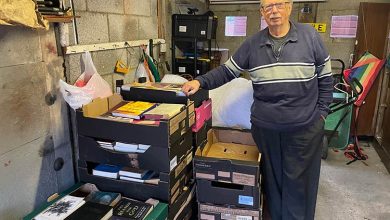Memorial plea for martyred Norfolk missionary

The city of Norwich, England, is home to a United Reformed Church (URC) that holds a significant piece of history within its walls. A plaque commemorating the life and sacrifice of Oliver Fellows Tomkins, a Norfolk missionary who died violently 124 years ago at the hands of cannibals in Papua New Guinea, is embedded in the church’s interior. As plans to redevelop the church into a performing arts center have been approved, a heartfelt plea has been issued to preserve the plaque and keep the memory of Tomkins alive. This story is not just about a historical figure, but about a family’s legacy and the impact of Christian missionary work on the world.
Oliver Fellows Tomkins was born in March 1873 in Great Yarmouth, Norfolk, to a family of Christian missionaries. His father, Daniel Tomkins, was a teacher, and his mother, Catherine Fellows, instilled in him a strong sense of faith from a young age. Tomkins was educated in Yarmouth and later in Switzerland, before returning to Britain to work at Colman’s mustard factory in Norwich. It was during this time that he became a member of the Congregational Church on Princes Street, which would later become the URC church where his plaque is now situated. Tomkins’ sense of purpose and passion for spreading the Christian faith led him to become a Sunday School teacher, a YMCA activist, and eventually, a missionary. He applied to the East London Missionary Training Institute and attended Livingstone College, where he prepared himself for the challenges of working in tropical countries.
Tomkins’ journey as a missionary took him to the Torres Strait in New Guinea, where he was ordained in 1899. He sailed to the region with Rev. Albert Pearse, celebrating the beginning of a new century at sea. Upon arrival, he joined forces with Scottish-born missionary James Chalmers, who would later become a close companion. The two men worked tirelessly to establish friendly relations with the local cannibal tribes, but their efforts were ultimately met with brutal violence. On Easter Sunday, 1901, Tomkins, Chalmers, and their native Christian companions were massacred and beheaded by the tribesmen. The news of Tomkins’ death did not reach his family for many months, and when it did, it sent shockwaves through the community. A memorial service was held at the Congregational Church on Princes Street, and a plaque was placed on the wall in his honor.
The story of Oliver Fellows Tomkins is one of courage, conviction, and tragedy. His great-nephew, Stephens Tomkins, an Emeritus Fellow at Homerton College, Cambridge, has been instrumental in keeping his memory alive. Stephens has asked the buyer of the URC church to consider the historical significance of the building and the plaque, which tells a unique story of pioneering Christian missionary work. The family’s legacy extends beyond Oliver’s story, as his father, Daniel Tomkins, was also a Christian missionary who worked in China. The impact of these early missionaries on the world was profound, and their stories deserve to be told and remembered. As Stephens Tomkins so eloquently put it, “The impact that those pioneering Christian missions had was fantastic, and the Papua New Guinea church considers Oliver Fellows Tomkins as one of its founders.”
The plea to preserve the plaque and keep Tomkins’ memory alive is not just about honoring a historical figure, but about recognizing the significance of his sacrifice. The story of Oliver Fellows Tomkins serves as a reminder of the bravery and selflessness of those who have dedicated their lives to spreading the Christian faith, often in the face of danger and adversity. As the URC church is redeveloped into a performing arts center, it is essential to consider the historical context and the emotional resonance of the plaque. The community must come together to ensure that Tomkins’ legacy is not forgotten and that his story continues to inspire future generations.
In 2001, a centenary commemoration was held to mark the 100th anniversary of Tomkins’ death, and a reconciliation ceremony was conducted between the families of Tomkins and Chalmers, and the tribe from Papua New Guinea. This poignant event served as a testament to the power of forgiveness and the human spirit’s capacity for healing and redemption. As we reflect on the life and sacrifice of Oliver Fellows Tomkins, we are reminded of the enduring impact of Christian missionary work on the world. The plaque in the URC church on Princes Street stands as a poignant reminder of the bravery and conviction of those who have dedicated their lives to spreading the Christian faith, and it is our responsibility to ensure that their stories are not forgotten. By preserving the plaque and keeping Tomkins’ memory alive, we honor not only his legacy but also the legacy of all those who have given their lives in service to others.








omxn3s
u16d0s
umop2z
I couldn’t resist commenting
Hi, i read your blog from time to time and i own a similar one and i was just curious if you get a lot of spam responses? If so how do you protect against it, any plugin or anything you can recommend? I get so much lately it’s driving me insane so any support is very much appreciated.
I like this website very much, Its a very nice spot to read and receive info .
The following time I learn a blog, I hope that it doesnt disappoint me as much as this one. I imply, I know it was my option to read, but I actually thought youd have something interesting to say. All I hear is a bunch of whining about one thing that you would fix should you werent too busy looking for attention.
Hi! I could have sworn I’ve been to this blog before but after checking through some of the post I realized it’s new to me. Anyways, I’m definitely delighted I found it and I’ll be book-marking and checking back often!
Greetings! I know this is kind of off topic but I was wondering which blog platform are you using for this website? I’m getting tired of WordPress because I’ve had issues with hackers and I’m looking at alternatives for another platform. I would be awesome if you could point me in the direction of a good platform.
Hello there, just became aware of your blog through Google, and found that it is really informative. I am going to watch out for brussels. I’ll appreciate if you continue this in future. Many people will be benefited from your writing. Cheers!
I’ve been surfing on-line greater than three hours today, yet I never discovered any interesting article like yours. It’s pretty value enough for me. Personally, if all web owners and bloggers made excellent content as you did, the net shall be much more useful than ever before. “Dreams have as much influence as actions.” by Stephane Mallarme.
What’s Happening i am new to this, I stumbled upon this I have found It absolutely helpful and it has aided me out loads. I hope to contribute & aid other users like its helped me. Great job.
When I originally commented I clicked the “Notify me when new comments are added” checkbox and now each time a comment is added I get three emails with the same comment. Is there any way you can remove me from that service? Thank you!
Almost all of what you claim happens to be astonishingly appropriate and that makes me wonder the reason why I had not looked at this in this light before. This piece really did switch the light on for me as far as this specific topic goes. Nonetheless there is actually just one position I am not too cozy with so whilst I attempt to reconcile that with the core theme of your position, allow me see just what all the rest of your visitors have to say.Very well done.
Hi, i read your blog from time to time and i own a similar one and i was just curious if you get a lot of spam comments? If so how do you stop it, any plugin or anything you can recommend? I get so much lately it’s driving me insane so any help is very much appreciated.